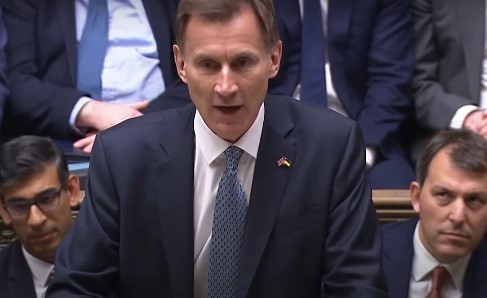Chancellor of the Exchequer Jeremy Hunt has announced funding worth £100m for charities in his spring budget.
He said he had made the decision after hearing representations from charities minister Stuart Andrew “about the brilliant work third sector organisations are doing to help people struggling in tough times”.
“They can often reach people in need that central or local government cannot so I will give his department £100m to support thousands of local charities and community organisations to do their fantastic work.”
Spring budget documents released specify that this funding “will be targeted towards those organisations most at risk, due to increased demand from vulnerable groups and higher delivery costs, as well as providing investment in energy efficiency measures to reduce future operating costs”.
Hunt also pledged a further £10m over the next two years to charities involved in suicide prevention.
Earlier this year a campaign was launched by charities with MoneySavingExpert.com founder Martin Lewis to rethink the energy price guarantee rise. Hunt said that the guarantee will remain at its current rate of £2,500 until July rather than the planned hike to £3,000 in April.
The NCVO said that Hunt’s announcements shows that “the government is recognising the vital role played by our voluntary sector and civil society”.
Here's an update on where we stand after 30 mins of the chancellor's #Budget2023 statement. We need to see detail but it's clear from the announcement of support that government is recognising vital role played by our #voluntarysector and #civilsociety - more analysis to follow pic.twitter.com/4ffWTs5vB3
— NCVO (@NCVO) March 15, 2023
The sector body’s policy and public affairs manager Chris Walker said Hunt’s announcement is a “welcome shift” in how the Treasury has “taken on board the role charities are playing and the challenges they’re facing”.
Meanwhile ACEVO chief executive Jane Ide welcomed Hunt’s acknowledgement of the work of charities and is recognition of “the unique role our sector plays in supporting individuals and communities”.
She also welcomed Hunt’s mention of specific measures the charity sector had called for, including tackling the mental health pressures faced by people amid the cost-of-living crisis. She also welcomed another announcement made by Hunt, of ensuring that bills of households on pre-payment meters are in line with those paying by direct debit.
“I think our sector can be very proud that it has been heard, been acknowledged and continues to have impact politically in ways that perhaps we have not seen for several years,” said Ide.
Incredibly welcome to hear the Chancellor acknowledge the "brilliant work of charities" and recognise the unique role our sector plays in supporting individuals and communities - and even more so to see his response to some of the key things that our sector has asked for.
— JaneIdeCEO (she/her) (@JaneIdeCEO) March 15, 2023
Chief Executive of Charities Aid Foundation chief executive Neil Heslop added: “Charities around the country continue to face rising costs, higher demand for their help and falling donations, so this recognition of their work is a step in the right direction.
"We look forward to hearing more about how this extra money will be targeted to those most in need.”
Other measures announced include more than £60m for public swimming pool providers to help with immediate cost pressures and to make facilities more energy efficient.
Hunt is also to extend the higher rates of tax relief for museums, galleries, theatres and orchestras for two years.
Budget 'ignores young people'
However, youth homelessness charity Centrepoint has raised concern that Hunt’s budget “ignores young people”.
The charity says it is “deeply disappointing” there has been no pledge to increase housing support and is “angered” by tougher sanctions on those on benefits to find work, which has also been announced by Hunt.
It said: “Sanctions have never been effective in helping people find jobs.”
Hunt’s budget also unveiled plans to increasing funding for free childcare places to cover one and two year olds and increase the allocation of free hours to three and four year olds.
But early years charity Early Years Alliance said that additional funding announced for the sector “is highly unlikely to match what’s needed to put providers on a steady footing”.
Its chief executive Neil Leitch said: “We know from bitter experience that expansions of so-called 'free childcare' without adequate investment are a recipe from utter disaster – and given that many providers rely on fees from younger children to make up for current funding shortfalls, the impact on the sector if the government gets this wrong cannot be underestimated.”
Food Foundation executive director Anna Taylor said that extra support for childcare is “the right decision” but is concerned that food poverty charities’ call for the government to extend the threshold for free school meals “is falling on deaf ears”.
“There remains a big gap in the support provided by Government to protect school-age children from the consequences of hunger and poor diet. This means 800,000 children living in poverty continue to miss out on Free School Meals," she said.
“Child food poverty has doubled in the last year – yet calls for government to extend the threshold for Free School Meals is falling on deaf ears.
“Free School Meals are one of the few existing policy levers available to us that directly and exclusively target vulnerable children.”













Recent Stories